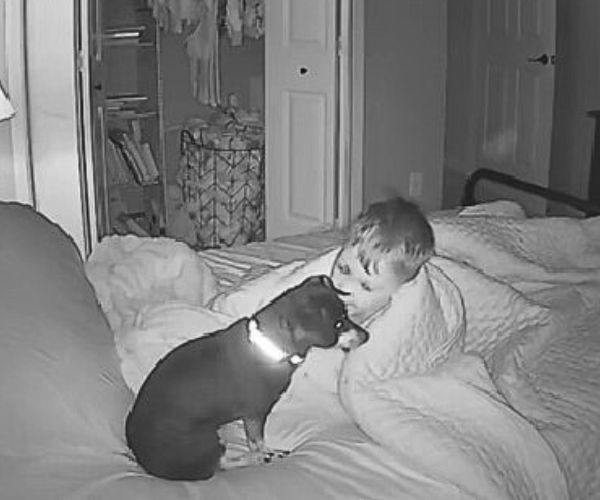Children and dogs are probably the most honest beings in the world. Young ones are not yet spoiled by everyday life, and canines are simply like that – full of sincere love, especially for their favourite people.
Now, imagine how these two souls come together how a beautiful situation can arise. Well, believe it or not, that’s exactly what happened in one home in Nashville, Tennessee, when a dog got into a toddler’s bed early in the morning.
One heartwarming sentence that came out of the kid’s mouth was enough to melt many hearts.
The Language Of Love

It is not uncommon for our furry companions to get up early in the morning and start waking up other people. However, this time, when the family’s favourite nine-year-old doggo sneaked into their little boy’s bed, they were all deeply touched by the scene.
The boy’s mom, Hannah Belcher, who was the first to see the video recorded by the camera in the room, was especially delighted. She witnessed a cute scene of a fur baby and her toddler in an intimate relationship, head to head as if whispering something in each other’s ear.
The beauty of this scene culminated when her little son finally uttered a real sentence in the dog’s ear.
“You’re my pal,” he told his furry companion. His mom, Hannah, was so touched that she had no other choice but to share the video on her TikTok profile.
This little guy was maybe not aware of the fact that the dog did not know human language. However, since he is a pure soul, he said it from the bottom of his heart, and that translated it into the language of love.
It’s a universal language that the dog certainly understood because if it wasn’t, this scene probably wouldn’t have attracted so many souls.
Many Melted Hearts
As I already stated, this video, shared by @hannahbelcher00, attracted a lot of attention. Not only was the family from Nashville, Tennessee, delighted by this special relationship between a dog and their toddler, but people from all around the world.
Below are some comments from the numerous TikTok users.

“I will never recover from this,” one user wrote.
“Nothing beats that unconditional love from a pet. I always felt sorry for the kids who wanted a pet and weren’t allowed to have one.” another added.
And, the third quipped: “me manifesting that your dog lives forever so your kid will always have his pal”
Sadly, dogs can not live forever, but even when they cross the rainbow bridge, they continue to live in our hearts because moments like this make them immortal.
If you’ve ever noticed your furry friend chattering their teeth, you might be wondering what’s behind this quirky behavior. Dogs, like humans, have their own ways of communicating, and teeth chattering is one of those mysterious signals they send. It’s a fascinating sight that can leave you curious about what’s going on in your pup’s mind.
When your dog starts chattering their teeth, it’s like a window into their world, offering a glimpse into their emotions and instincts. This intriguing phenomenon can happen for various reasons, and understanding the triggers behind it can help you connect better with your canine companion. So, next time you catch your dog chattering away, remember that there’s more to it than meets the eye.
Understanding Dog Behavior: Teeth Chattering
The Basics of Canine Non-verbal Communication
Dogs use various forms of communication to express themselves, including body language and vocalizations. One common non-verbal cue is teeth chattering. When dogs chatter their teeth, it’s a way for them to convey their emotions or needs without barking or whining. This behavior is often a sign that your furry friend is trying to communicate something important to you.
What Teeth Chattering Could Indicate in Dogs
Teeth chattering in dogs can indicate a range of emotions or sensations. It may signal excitement, anxiety, fear, or even pain. Pay attention to the context in which your dog exhibits this behavior. For example, if your dog chatters their teeth when meeting new people or in unfamiliar environments, it could be a sign of nervousness or discomfort. Understanding what triggers your dog’s teeth chattering can help you address their needs and ensure their well-being.
Common Causes of Teeth Chattering in Dogs
Reaction to Cold Weather
When dogs chatter their teeth in cold weather, it’s usually a physiological response to regulate body temperature. This behavior helps generate heat, similar to shivering in humans. So, if you see your pup’s teeth chattering on a chilly day, it’s likely their way of staying warm.
Scent Detection and Analysis
Teeth chattering can also occur when your dog is intensely focused on scent detection and analysis. In these moments, the heightened concentration and excitement can lead to teeth chattering as they process the information they’re receiving through their keen sense of smell. It’s a sign that your furry friend is fully engaged in exploring the scents around them.
Emotional Responses
Dogs may chatter their teeth in response to various emotions such as excitement, anxiety, fear, or even pain. It’s crucial to pay attention to the context in which this behavior occurs to understand what your dog might be feeling. By recognizing these emotional triggers for teeth chattering, you can better support your dog’s well-being and strengthen your bond with them.
Dental Concerns and Health Issues
Dental Pain or Discomfort
If your dog is chattering their teeth, it could be a sign of dental pain or discomfort. Dental issues such as tooth decay, gum disease, or a cracked tooth may cause your dog to chatter their teeth. It’s essential to have your vet examine your dog’s mouth to address any dental problems promptly.
Neurological Disorders
Teeth chattering in dogs can also be linked to neurological disorders. Conditions like epilepsy, distemper, or other neurological issues can manifest through teeth chattering. If you notice this behavior frequently, consult your vet to rule out any underlying neurological conditions.
Other Health Complications
In some cases, teeth chattering may indicate other health complications in your dog. Issues such as fever, pain, or organ dysfunction can trigger teeth chattering. Monitoring your dog’s overall health and behavior, along with seeking veterinary advice when necessary, is crucial in identifying and addressing any underlying health issues.
Behavioral and Psychological Factors
Nervousness and Anxiety in Dogs
When your dog feels nervous or anxious, they might exhibit teeth chattering. This behavior can be a sign that your furry friend is feeling stressed or uneasy. Pay attention to the triggers that may be causing your dog to feel this way, such as loud noises, new environments, or being separated from their favorite human.
Excitement and Anticipatory Behavior
Dogs can also chatter their teeth out of excitement or anticipation. If your dog is eagerly waiting for a treat or a walk, you may notice them chattering their teeth as they express their enthusiasm. This behavior is a natural response to heightened excitement and is usually nothing to worry about.
Remember, observing your dog’s teeth chattering behavior in different contexts can help you understand their emotional state better and respond accordingly. If you notice excessive or unusual teeth chattering, it’s essential to consult with a vet to rule out any underlying health issues and ensure your dog’s well-being.
When to Consult a Veterinarian
Observing Accompanying Symptoms
If you notice your dog’s teeth chattering along with other concerning symptoms like drooling, lethargy, or changes in appetite, it’s essential to consult a veterinarian promptly. These accompanying signs could indicate an underlying health issue that needs professional attention. Your vet can assess the overall health of your dog and provide a proper diagnosis.
Ongoing or Frequent Teeth Chattering
While occasional teeth chattering may not be alarming, persistent or frequent episodes could signal a more significant problem. If your dog is constantly chattering their teeth without any apparent cause or if the behavior escalates, seeking veterinary advice is crucial. Your vet can conduct necessary tests to identify any potential health issues causing this behavior and recommend appropriate treatment options.
Remember, your dog’s well-being is paramount, and consulting a veterinarian when you notice unusual or excessive teeth chattering can help ensure they receive the care they need.
Conclusion
Now you know that dogs chatter their teeth for various reasons, from expressing emotions like excitement or anxiety to potential health issues like dental problems or neurological disorders. Understanding why your furry friend is chattering their teeth can offer valuable insights into their well-being. Remember, if you notice any concerning symptoms accompanying teeth chattering, such as drooling or lethargy, it’s essential to seek advice from a veterinarian promptly. By staying attentive to your dog’s behavior and seeking professional help when needed, you can ensure they receive the care they deserve. So, the next time you see your dog chattering their teeth, pay attention to the context and their overall health to keep them happy and healthy.
Frequently Asked Questions
What are the common reasons for dogs to chatter their teeth?
Dogs may chatter their teeth to communicate emotions like excitement, anxiety, fear, or pain. It can also happen in response to cold weather or during intense scent detection activities.
What health issues can be linked to teeth chattering in dogs?
Teeth chattering in dogs can be a sign of dental problems such as tooth decay or gum disease, neurological disorders like epilepsy, or other health concerns such as fever or organ dysfunction.
Are there behavioral factors that contribute to teeth chattering in dogs?
Yes, teeth chattering in dogs can stem from behavioral and psychological factors like nervousness, anxiety, or excitement, indicating stress, unease, or anticipation.
When should I seek veterinary advice regarding my dog’s teeth chattering?
If your dog’s teeth chattering is accompanied by symptoms like drooling, lethargy, or changes in appetite, consulting a veterinarian is essential. Persistent or frequent teeth chattering may signal underlying health issues requiring professional attention for your dog’s well-being.
[no_toc]

Hey there, I’m Janet Brooks, a dog-loving student from California. I’m all about helping pups in need, especially those without homes. Me and my awesome friends work together to give shelter and love to stray dogs. Oh, and I also write blogs about dogs to share helpful info.